Arrays and Functions
Assumed Knowledge
Learning Outcomes
- Understand how to pass arrays to, and return arrays from, functions
Passing an array to a function
When you pass an array to a function, a reference copy of the actual parameter is made into the formal parameter. Thus, the array inside the function refers to the same array that was passed.
1
2
3
4
5
6
7
8
9
10
11
12
void setup() {
int[] data = {10, 70, 20, 90};
int sum = total(data); //outputs 190
}
int total(int[] arr) {
int result = 0;
for(int i=0; i < arr.length; i++) {
result+=arr[i];
}
return result;
}
Here, arr is a reference copy of data.
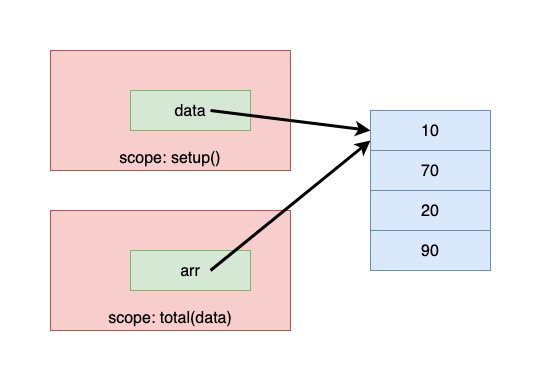
Another example:
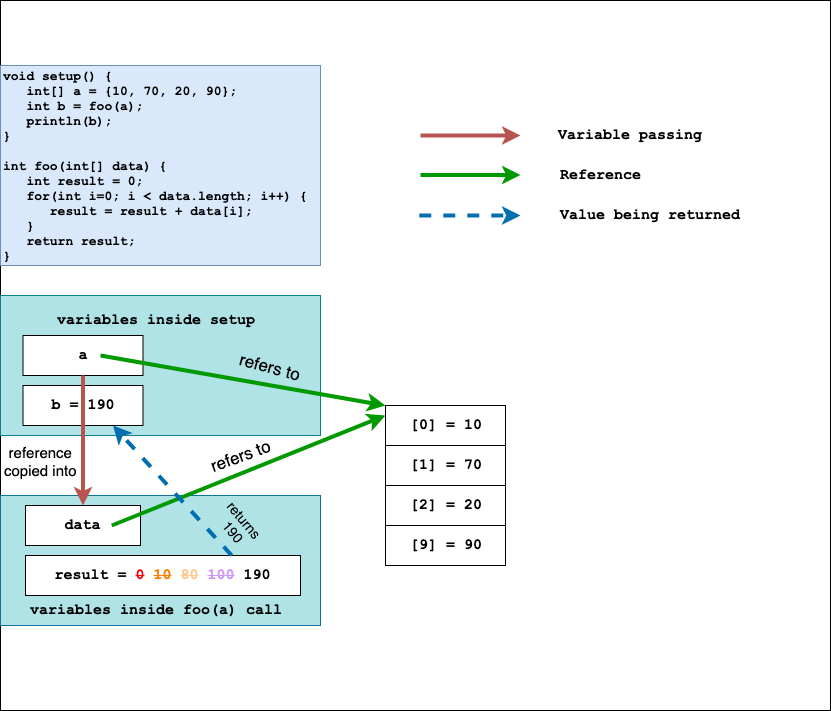
Modifying array contents inside a function
When you modify the contents of an array inside a function, the contents of the passed array are also modified, because we are operating on the reference copy (see previous diagram).
1
2
3
4
5
6
7
8
9
10
11
12
13
14
void setup() {
int[] data = {10, 70, 20, 90};
negate(data);
for(int i=0; i < data.length; i++) {
print(data[i]+" ");
} //outputs -10 -70 -20 -90
}
void negate(int[] arr) {
int result = 0;
for(int i=0; i < arr.length; i++) {
arr[i]*=-1;
}
}
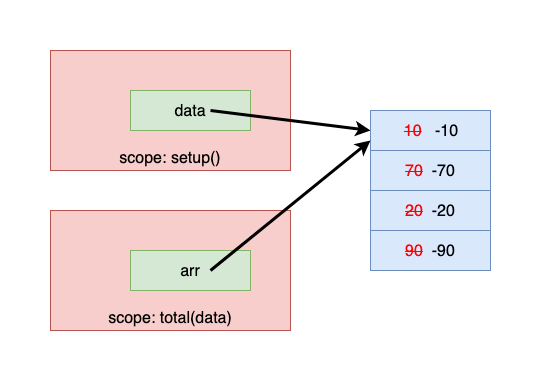
Modifying an array itself inside a function
When you modify (re-reference) the array itself inside a function, the passed array is NOT modified, because we re-referenced the reference copy.
1
2
3
4
5
6
7
8
9
10
11
void setup() {
int[] data = {10, 70, 20, 90};
expand(data);
for(int i=0; i < data.length; i++) {
print(data[i]+" ");
} //outputs 10 70 20 90
}
void expand(int[] arr) {
arr = new int[10];
}
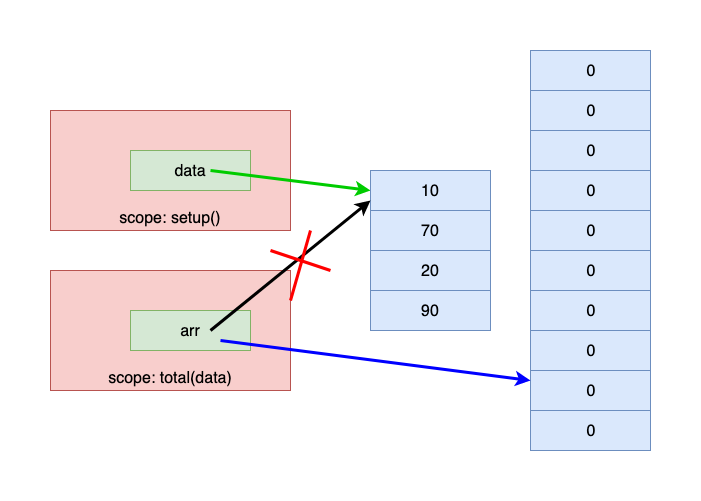
Returning an array from a function
You can always create an array and return it from a function
Example 1 (with memory diagram)
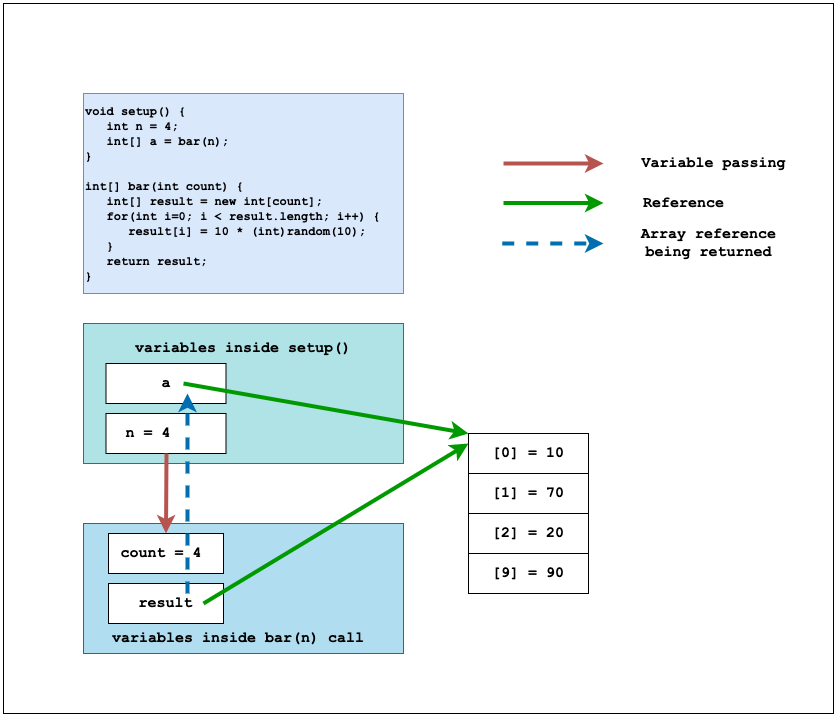
Example 2
1
2
3
4
5
6
7
8
9
10
11
12
13
14
15
16
17
18
19
20
21
22
23
24
25
26
27
void setup() {
int[] data = {10, 70, -20, -90, 30, 80, 60, 0, -50};
int[] sub = getFirst(data, 4);
for(int i=0; i < sub.length; i++) {
print(sub[i]+" ");
} //outputs 10 70 -20 -90
int[] bar = getFirst(data, 2);
for(int i=0; i < bar.length; i++) {
print(bar[i]+" ");
} //outputs 10 70
for(int i=0; i < data.length; i++) {
print(data[i]+" ");
} //outputs 10 70 -20 -90 30 80 60 0 -50
}
int[] getFirst(int[] arr, int n) { //we assume n>=0, n<arr.length
int[] result = new int[n];
for(int i=0; i < n; i++) {
result[i] = arr[i];
}
return result;
}
Example 3
1
2
3
4
5
6
7
8
9
10
11
12
13
14
15
16
17
18
19
20
21
22
23
24
25
26
27
28
29
30
31
32
33
void setup() {
int[] data = {10, 70, -20, -90, 30, 80, 60, 0, -50};
int[] negs = getNegativeItems(data);
for(int i=0; i < negs.length; i++) {
print(negs[i]+" ");
} //outputs -20 -90 -50
for(int i=0; i < data.length; i++) {
print(data[i]+" ");
} //outputs 10 70 -20 -90 30 80 60 0 -50
}
int[] getNegativeItems(int[] arr) {
int count = 0;
for(int i=0; i < arr.length; i++) {
if(arr[i] < 0) { //negative
count++;
}
}
int[] result = new int[count];
int destIndex = 0;
for(int i=0; i < arr.length; i++) {
if(arr[i] < 0) { //negative
result[destIndex] = arr[i];
destIndex++;
}
}
return result;
}
Exercise 1
Complete the following function definition. The name of the function clearly indicates what is expected from the function.
1
2
3
4
5
6
7
8
9
int countPositiveItems(float[] data) {
int result = 0;
for(int i=0; i < data.length; i++) {
if(TRUE) { //replace TRUE with a boolean expression that checks if the current item is positive
result+=data[i];
}
}
return result;
}
Exercise 2
Define a function that when passed an integer array, returns the number of odd numbers in the array.
Exercise 3
Define a function that when passed two boolean arrays, returns true if they contain the same number of items, false otherwise.
Exercise 4
Define a function that when passed two floating-point arrays that are guaranteed to be of the same lengths, returns an array where each item is the product of the corresponding items in the passed arrays.
For example, if the arrays passed are {1.2, 1.5, 1.3} and {1.8, 1.6, 1.9}, the array returned should be {1.2*1.8, 1.5*1.6, 1.4*1.9}.
Exercise 5
Define a function that when passed a char array, returns the reverse of the array. The array passed should NOT be modified.
Exercise 6
Define a function that when passed an integer (say, n), returns an array that holds the first n prime numbers.
For example, if n = 5, return the array {2, 3, 5, 7, 11}.